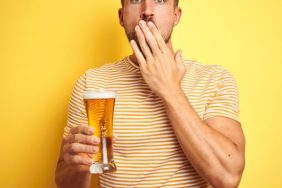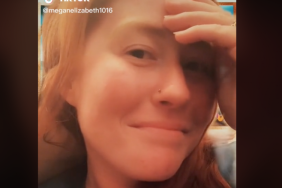Photo: burakkarademir, Getty Images.
Plenty of people use alcohol to calm their nerves before a first date, but a new study reveals that this anxiety tamer may be detrimental to your relationship later on. RecoveryFirst.org recently surveyed 500 Americans about their drinking habits and their relationships; what it found might make you think twice before dating under the influence. Read on for the poll’s findings in this Crave Online exclusive.
Come Here Often?
Most of those polled have their friends to thank for helping them meet their current significant other. Over 31 percent met through a friend. Almost as many – 29 percent – hooked up via online dating or social media. The least likely way those polled met their mates? Through work, school, or at a bar.
It would seem that of all the ways to meet someone, the couples who endured the longest (an average of 12 years) met through school. Meeting through work was the second best predictor of relationship longevity. As for those with the shortest relationship life spans? Those who met online. That doesn’t mean you should give up online dating; five percent of married Americans met that way.
Drinks on the First Date

Whether or not being buzzed when you meet your mate predicts problems later on is beyond the scope of this poll, but there is an interesting relationship between drinking at the start of a relationship and satisfaction later on. Those who were sober on the first date were more likely to report no current problems (10 percent of women and 13 percent of men) compared to 8 percent of women and 7 percent of men who drank on the first date. It’s not a huge discrepancy, but when pollsters looked at those reporting “a lot” of problems in their relationships, they found that first-date drinkers were at 5 percent (women) and 6 percent (women). In layman’s terms, there is a slightly higher correlation between being buzzed on a first date and problematic relationships down the road.
Can’t Get No Satisfaction
Here’s where things get interesting. When asked if they were satisfied with their relationships, the gap between first-date drinkers and sober first-daters widens. Ten percent of those buzzed on the first date said they were dissatisfied with their current relationship while only 5 percent of those who were sober on the first date said the same.
Location, Location, Location
Where you drink with your date might also impact your relationship satisfaction. Over one-third of couples who frequented breweries, sports bars, or nightclubs reported complete satisfaction with their relationships. Those who hung out in dive bars, however, reported complete satisfaction at a much lower rate: only one in five people. Dive barflies were the most likely to report that their relationships were plagued with “several” problems. Where are couples most content? It would appear those who drink in sports bars (12 percent reported no relationship problems), followed closely by those who prefer breweries (10 percent) and non-drinking establishments (10 percent).
What You Drink Matters

Tequila and rum drinkers reported “many” problems in their relationships at a higher rate (31 percent) than those who favored other kinds of beverages. Surprisingly, 29 percent of non-drinkers reported “many” problems, followed by beer (24 percent), vodka and whiskey (both 23 percent) drinkers.
Less Booze = A Longer Relationship?
The longer the relationship, the less likely partners were to drink together each month. Couples together one year averaged six drinks together per month while couples together ten years or more averaged half that. Any number of theories could attempt to explain this trend. RecoveryFirst.org breaks it down like this: “Relationship experts indicate that relationship problems can become exacerbated when alcohol is included. While light drinking of certain types of alcohol may pose some health benefits, excessive drinking can have negative impacts on the body and mind. Too much alcohol can make it harder to sleep, cause a sense of anxiousness after the effects have worn off, and even cause depression. Binge drinkers may experience even more troubling side effects, including mood changes, aggression, and other mental health issues.”
When in Doubt, Don’t
This poll wasn’t designed to predict the effect on alcohol and relationships, but it did show a correlation between frequency, amount, and type of alcohol consumption with satisfaction in long-term relationships. Coupling up and staying together is hard enough as it is; if you want your relationship to go the distance – and satisfy both parties – this poll suggests you’d be wise to put the bottle down.








